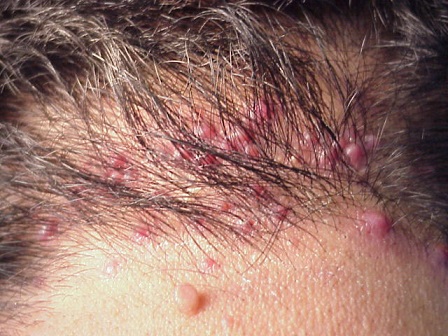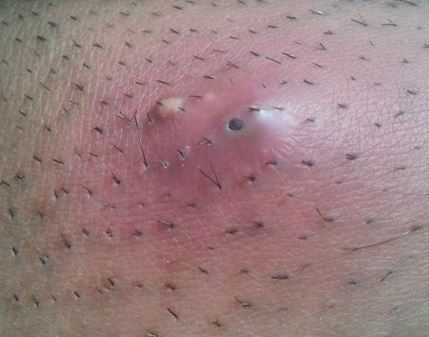 New Health Guide
New Health Guide
Hair follicle is basically the sac where your hair grows. There are sensory nerves fibers at the base of the hair follicle – these fibers cover the hair bulb. You stimulate these nerve fibers whenever you bend your hair. These nerve fibers make you know when your hair is bent or moved. There are also sebaceous glands that produce oil to condition the hair and the surrounding skin. Sometimes, you notice swollen hair follicle, which generally indicates an infection or an ingrown hair. Whatever the case, it is important to identify the cause and select an appropriate treatment option to eliminate swelling.
 Folliculitis refers to an infection or inflammation of the hair follicles of the skin. If it is folliculitis, you will notice many hair follicles become affected. There will be small pus-filled pimples, each of which will look like a rounded, yellow-red spot.
Folliculitis refers to an infection or inflammation of the hair follicles of the skin. If it is folliculitis, you will notice many hair follicles become affected. There will be small pus-filled pimples, each of which will look like a rounded, yellow-red spot.
Types of Folliculitis
You may have swollen hair follicle due to folliculitis, but you need to identify the type of folliculitis first to select the right treatment option. For instance:
Causes
You develop folliculitis due to a bacterial infection, but yeast and fungal infections may also cause this condition. Wearing clothes that rub the skin or shaving in the wrong way may irritate the follicles and lead to folliculitis. Sometimes, hair follicles are irritated or blocked by machine oils, sweat, or makeup and eventually swell.
People who use a whirlpool, hot tub, or swimming pool that is not treated with chlorine are at a greater risk of developing this condition. You may also develop folliculitis if you have an infected cut or surgical wound. In rare cases, folliculitis is the outcome of diseases such as HIV or diabetes that leave you with a compromised immune system.
 Ingrown hair can lead to swollen hair follicle that looks like folliculitis. It refers to a condition when your hair curls around and starts growing back into the skin. You are at a greater risk of develop ingrown hair if you have coarse or curly hair. You may also experience the same situation when dead skin cells block the hair follicle.
Ingrown hair can lead to swollen hair follicle that looks like folliculitis. It refers to a condition when your hair curls around and starts growing back into the skin. You are at a greater risk of develop ingrown hair if you have coarse or curly hair. You may also experience the same situation when dead skin cells block the hair follicle.
When you have ingrown hairs, you will notice a raised, red bump develop on the affected area. The bump is usually quite painful. These bumps are more common on the biking area in women and on the cheeks, chin, or neck in men. These bumps go away without treatment, but if they persist, that means an infection has developed.
It actually depends on what you have done before noticing any swollen hair follicle.
If you have swollen hair follicle due to folliculitis, you can take the following steps for relief.
You can take certain steps to help clear up folliculitis. Here is what you can do if folliculitis is mild:
In case you have a swollen hair follicle due to ingrown hair, you can use a pair of tweezers to pluck the hair out of your skin. While it may be tricky for some, this offers relief once you do it right. Do not forget to sanitize the area after you have plucked the ingrown hair to prevent infection. The swelling will go away once you have eliminated the problem hair. It is important to keep in mind though that sometimes the same hair keeps growing back at an awkward angle, which means you will have to pluck it several times to keep it from bothering you.
Be sure to talk to your doctor if your swollen hair follicle is not due to an ingrown hair and antibiotic creams do not seem to work either. It may be due to an underlying medical condition and only your doctor can make a diagnosis after careful examination.